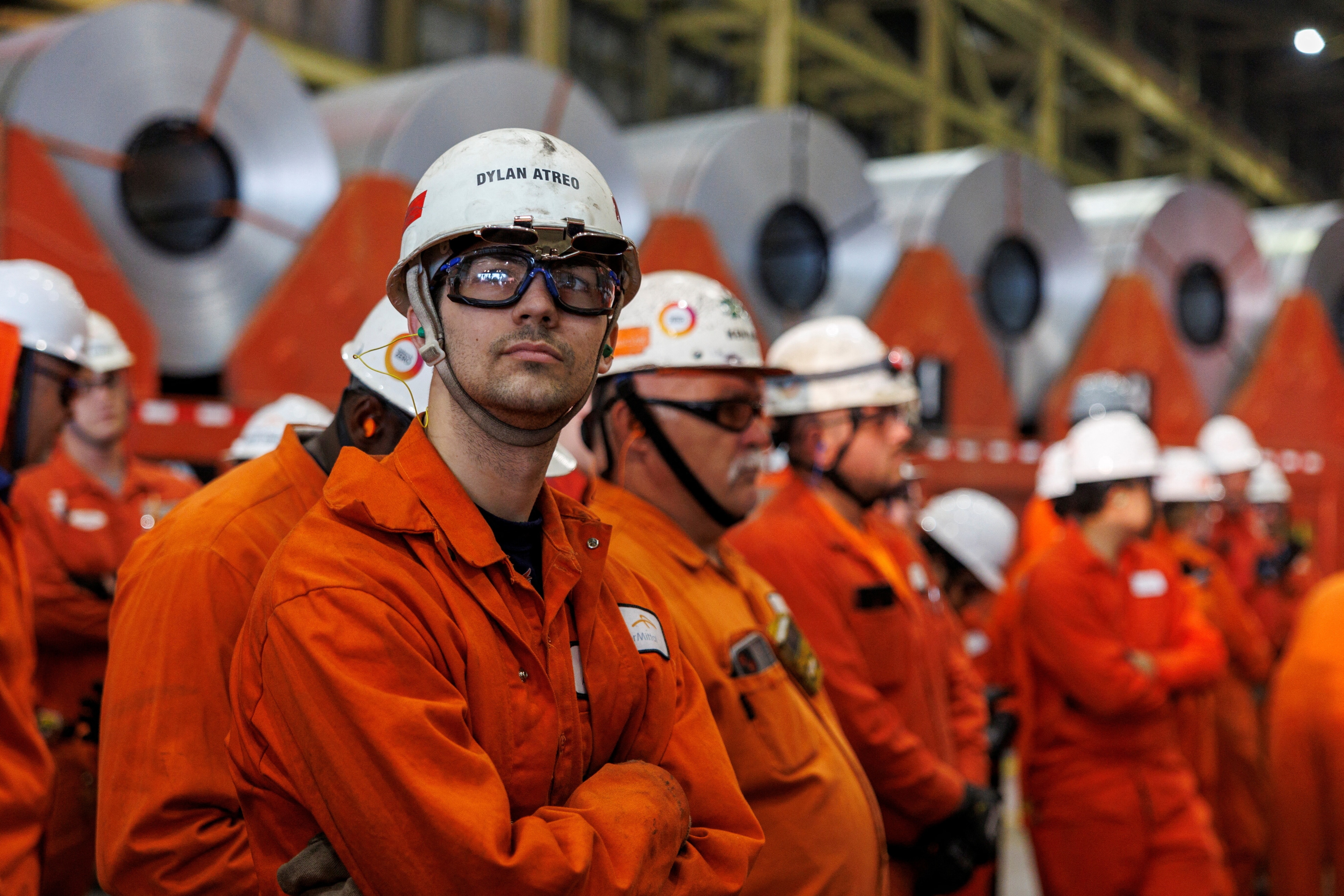‘We are at a crossroads for the global economy.’ The WTO's chief economist talks to Radio Davos

What route will the global economy take in 2025?
Image: Michael Kanivetsky/Pexels
Stay up to date:
Trade and Investment
- Uncertainty reigns over the world economy, with big questions around the use of tariffs and the impact they might have on international trade.
- This is already affecting investment decisions, but is not causing 'deglobalization', World Trade Organization Chief Economist says.
- 'Trade between China and the United States accounts for less than 3% of world trade, but generates 80% of the news,' he tells Radio Davos.
- The podcast dissects the Forum's new Chief Economists Outlook, published days ahead of the Annual Meeting in Davos.
- Listen here or on any podcast app via this link, or on YouTube.
Accept our marketing cookies to access this content.
These cookies are currently disabled in your browser.
The world is beginning 2025 at a crossroads, according to Ralph Ossa, chief economist at World Trade Organization (WTO).
“We see some geoeconomic fragmentation, but we don't see yet any deglobalization. The policy choices that are being made now – this year – are really going to determine which path we are going to go down as a global economy; whether that's a path that embraces international trade or a path that disrupts international trade.”
Ossa has been at the WTO for two years, having previously spent close to two decades in academia – with roles at Princeton University, the University of Chicago, and the University of Zurich. His research has centred primarily on international economics, with a particular focus on policy, looking at the economics of trade wars and trade talks – and how much countries gain from international trade.
These were among the issues he discussed in-depth in the latest episode of the World Economic Forum’s Radio Davos podcast, recorded as the newest edition of the Forum’s Chief Economists Outlook was being released.

At this crucial moment for the world economy and international trade – with Donald Trump returning to the White House and promising to impose sweeping tariffs in order to promote American manufacturing (a policy dubbed "Maganomics") – how will 2025 progress? What path will the global economy follow?
Here are the key points from Ossa’s interview:
The global economy still resilient, if weaker than before
“It's important to remember that the global economy has been remarkably resilient and continues to be remarkably resilient,” Ossa says. “After the pandemic, we had relatively stable growth in 2023-24, and we expect the same for 2025, which is quite remarkable given all the difficulties that the global economy has been facing, all the shocks that have been thrown at it.
“At the same time, the growth rate is still subdued. It's about one percentage point lower than it used to be in the 2010s. And that's not just because of weak Europe. That's a broader phenomenon.

“And lastly, uncertainty is extremely high. We are waiting to see what the new [US] administration is going to do and how the world is going to react. And I think that's going to determine a lot of where things are headed.”
“[Uncertainty] is already affecting investment decisions, affecting trade flows. One thing that I always say, particularly when you think about international trade, is [to think] not just about trade costs, not just about tariffs, but about the expectation of what these trade costs and tariffs are going to be. Because if you as an investor can't be sure what tariffs are going to be next year, what they're going to be in five years, then already today, even though nothing might have happened, it's already going to affect your choices.”
Trade, tariffs and 'friendshoring'
Despite widespread talk of economic fragmentation amid global tensions, Ossa has seen little evidence of serious dents to international trade – although he has seen shifts in its patterns.
“Trade growth is more or less proportional to GDP growth, so the trade-to-GDP ratio actually on average hasn't really changed that much,” he says. “But what we do see is trade reorienting on geopolitical lines. This is most obvious in the relationship between China and the United States.
“Since the first wave of Trump tariffs from the previous administration, bilateral trade between China and the United States has grown much, much more slowly than trade between either of these countries and third countries."

So as well as dragging on China-US trade, are there factors facilitating trade between these countries and others?
“One thing we've done in our analysis [at the WTO], we have divided the world into hypothetical geopolitical blocs based on voting behaviour at the United Nations General Assembly, and you see quite clearly the trade between these, quote unquote, 'blocs' is growing more slowly than trade within these blocs, meaning that there is some evidence of our friendshoring.”
I expect firms and countries to hedge their bets and really diversify their trade rather than rely on individual partners, be they friends or geopolitical rivals.
—WTO Chief Economist Ralph Ossa
”Is this trend likely to continue – and strengthen – in the years ahead? Not necessarily.
“Some tariffs have been threatened to be imposed against geopolitical allies. So maybe this is going to make those friends, making them a little bit less attractive. Politics is very polarized, so who's your friend today may not be your friend tomorrow. I expect firms and countries to hedge their bets and really diversify their trade rather than rely on individual partners, be they friends or geopolitical rivals.”
Frictions and fictions
Whatever happens with tariffs, “there's a large chunk of international trade that can be kept clear of these frictions”, according to Ossa.
“Bilateral trade between China and the United States actually only accounts for less than 3% of world trade,” he notes. “It generates 80% of the news, but only 3% of world trade.
“It's safe to predict that trade tensions between these two countries are going to persist – but I think the key question is, is this going to spread to other countries or is this going to be contained to that bilateral relationship?
“More than 75% of world trade is still conducted directly on WTO terms, meaning directly under the most favoured nation [MFN] tariffs of the WTO, and 85% of US exports are conducted directly under MFN tariffs.”
How is the World Economic Forum improving trade for more resilient societies?
How long will this remain the case, however, and why might a country want to shift away from MFN terms?
“There's all sorts of economic reasons why you unilaterally might want to impose tariffs, perhaps to expand your manufacturing sector, perhaps to generate additional jobs, perhaps to protect domestic industries,” Ossa says.
“The problem is that other countries have the same incentive. So if I try to expand my manufacturing sector at your expense and you try to expand yours at my expense, at the end of the day, none of us has achieved that objective and all we've done is increase prices for our consumers and for our firms, which ultimately hurts the economy.”
From inflation to deflation?
Increasing prices is something that people have learned plenty about in recent years, and they are still feeling the effects.
“I think much of the political discontent that we see at the moment with the economic situation is not so much about the incremental change in prices, but it's just the fact that you go to a grocery store and things are still a lot more expensive than they have been in the past,” Ossa says. “The cumulative increase in prices is still hurting a lot of households significantly.”
However, households and economies can also be hurt when things turn the other way.
“In China in particular, the concern now seems to be deflation. People are concerned that China could repeat some of the experience that Japan had [in the 1990s], where you had a kind of unholy combination of deflation difficulties in the housing sector.”
Economic success is crucial for success in many of the other important indicators, be it life expectancy, child mortality, literacy and so on.
—WTO Chief Economist Ralph Ossa
”Yet, are traditional measures such as inflation and GDP the only ways we should be measuring economies in a rapidly changing world?
“GDP is the key summary statistic and I think it's going to continue to be that way. Having said that, it's a highly imperfect measure. It doesn't tell you anything about inequality, it doesn't tell you anything about non-market activities, and the issue of environmental degradation.
“But if you look at the Human Development Index, which tries to take other metrics into account, education and health in particular, it ends up being extremely highly correlated [to GDP] for most economies. At the end of the day, economic success is crucial for success in many of the other important indicators, be it life expectancy, child mortality, literacy and so on.”
So how can nations ensure they achieve that economic success?
“I think all of us would agree that the division of labour is an absolutely fundamental pillar of our prosperity,” Ossa concludes. “If I had to make all of my clothes, all of my food, all of my housing, all of my shelter and so on, by myself personally, clearly this would be a disaster. So what do I do? I specialize in something, you specialize in something, and we exchange.
“International trade is just an extension of this very basic idea across international borders. Why should the power of the division of labour stop just because there's an international border in the way?
“I’m really hoping that policymakers also support that, influenced by business interests, by consumer interests, by civil society. They will come to appreciate that we are all better off cooperating and we are better off trading than moving towards some sort of tit-for-tat situation that is going to leave all of us worse off.”
Check out all our podcasts on wef.ch/podcasts:
Don't miss any update on this topic
Create a free account and access your personalized content collection with our latest publications and analyses.
License and Republishing
World Economic Forum articles may be republished in accordance with the Creative Commons Attribution-NonCommercial-NoDerivatives 4.0 International Public License, and in accordance with our Terms of Use.
The views expressed in this article are those of the author alone and not the World Economic Forum.
Related topics:
Forum Stories newsletter
Bringing you weekly curated insights and analysis on the global issues that matter.
More on Economic GrowthSee all
Charlotte Edmond
July 30, 2025
Naoko Tochibayashi
July 30, 2025
Matt Watters
July 29, 2025
David Elliott
July 28, 2025
Michael Wang
July 28, 2025
Ivan Shkvarun
July 25, 2025






